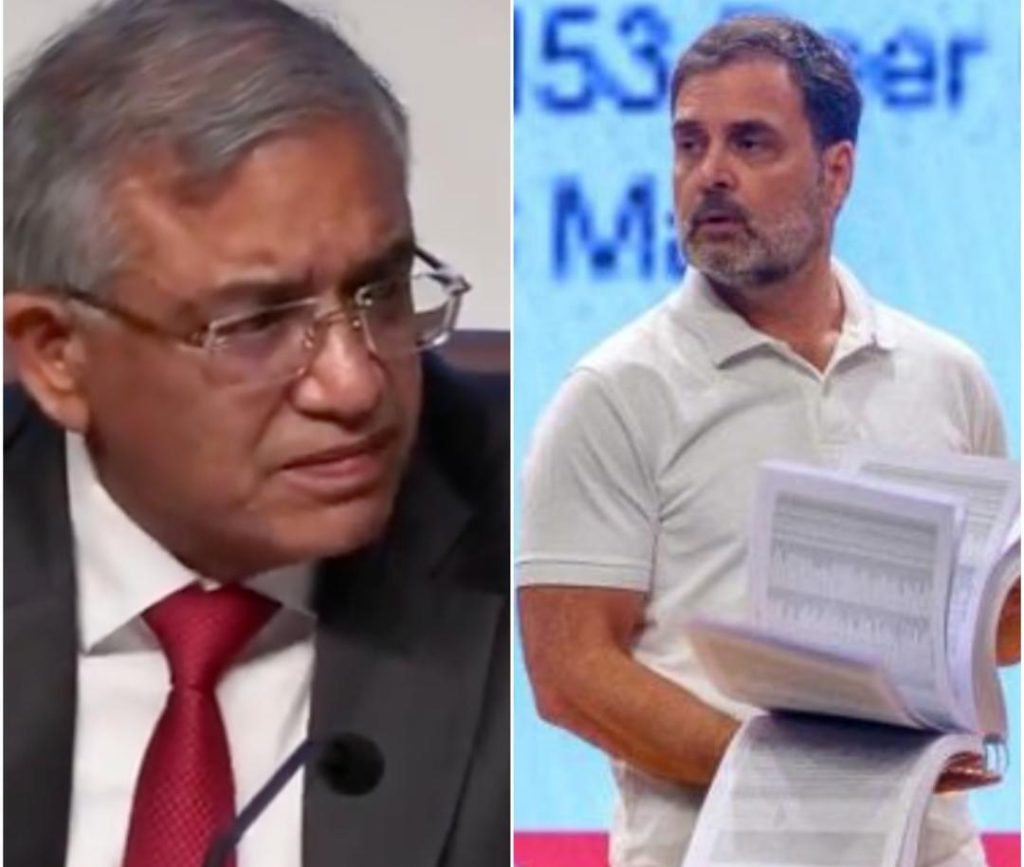
Vote Chori’ Phrase an Insult; Should We Share CCTV Footage of Mothers & Sisters Voting? EC
In the ongoing political debate, the Election Commission of India (EC) has criticized the use of the term “vote chori” (vote stealing) by Congress leader Rahul Gandhi, terming it an insult to the Constitution. The EC has also expressed concerns over the demand to release surveillance footage from polling booths, citing voter privacy concerns.
The controversy began when Rahul Gandhi, while campaigning in Uttar Pradesh, accused the ruling party of manipulating the electoral process and stealing votes. Gandhi’s statement was met with strong opposition from the ruling party, which termed his remarks as “baseless” and “biased”.
However, the EC has taken a firm stance against the use of the term “vote chori”, with Chief Election Commissioner (CEC) Gyanesh Kumar describing it as an insult to the Constitution. Kumar emphasized that the integrity of the electoral process is ensured through various measures, including the use of EVMs and VVPATs, and that any allegations of vote rigging are thoroughly investigated.
The EC’s statement comes at a time when there is growing demand to release surveillance footage from polling booths to address concerns over the integrity of the electoral process. However, the EC has refused to share the footage, citing voter privacy concerns.
In a recent interview, Kumar asked a pertinent question: “Should the Election Commission share the CCTV videos of any voter, including their mothers, daughters-in-law?” He emphasized that the EC’s primary concern is to ensure the privacy and security of voters, and that releasing the footage would compromise this fundamental right.
The EC’s stance is based on the principle that the privacy of voters is a fundamental right enshrined in the Constitution. The Right to Information Act, 2005, also protects the privacy of individuals, including their personal data, including video footage.
The demand for releasing surveillance footage is not new. In the past, several political parties have demanded the release of footage to address allegations of electoral malpractices. However, the EC has consistently refused to share the footage, citing concerns over voter privacy and the potential misuse of the material.
The EC’s concerns are justified, as releasing surveillance footage could potentially compromise the privacy of voters. In today’s digital age, personal data is highly valuable, and releasing footage of voters could lead to privacy breaches and potential identity theft.
Moreover, the EC’s stance is also based on the principle of fairness and equality. Releasing footage of voters without their consent could create a sense of unfairness and bias, as some voters may be identifiable, while others may not. This could lead to a perception of favoritism and compromise the integrity of the electoral process.
In conclusion, while the demand for releasing surveillance footage may seem justified, the EC’s stance is based on sound principles of voter privacy and fairness. The integrity of the electoral process is ensured through various measures, including the use of EVMs and VVPATs, and any allegations of vote rigging are thoroughly investigated.
In the ongoing political debate, the EC’s criticism of the term “vote chori” is also justified. The term is an insult to the Constitution and undermines the integrity of the electoral process. The EC’s primary concern is to ensure the fairness and transparency of the electoral process, and any statements or actions that compromise this fundamental right are unacceptable.
As the election season gathers pace, it is essential for political parties to refrain from making baseless allegations and to focus on issues that matter to the voters. The EC’s stance on releasing surveillance footage and the criticism of the term “vote chori” are a reminder of the importance of maintaining the integrity of the electoral process and respecting the privacy of voters.






